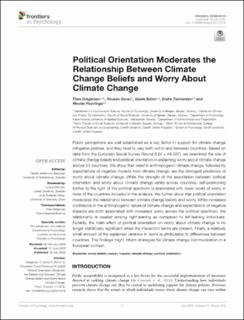| dc.contributor.author | Gregersen, Thea | |
| dc.contributor.author | Doran, Rouven | |
| dc.contributor.author | Böhm, Gisela | |
| dc.contributor.author | Tvinnereim, Endre | |
| dc.contributor.author | Poortinga, Wouter | |
| dc.date.accessioned | 2021-02-23T10:08:07Z | |
| dc.date.available | 2021-02-23T10:08:07Z | |
| dc.date.created | 2020-07-16T12:59:31Z | |
| dc.date.issued | 2020 | |
| dc.identifier.issn | 1664-1078 | |
| dc.identifier.uri | https://hdl.handle.net/11250/2729717 | |
| dc.description.abstract | Public perceptions are well established as a key factor in support for climate change mitigation policies, and they tend to vary both within and between countries. Based on data from the European Social Survey Round 8 (N = 44,387), we examined the role of climate change beliefs and political orientation in explaining worry about climate change across 23 countries. We show that belief in anthropogenic climate change, followed by expectations of negative impacts from climate change, are the strongest predictors of worry about climate change. While the strength of the association between political orientation and worry about climate change varies across countries, self-positioning further to the right of the political spectrum is associated with lower levels of worry in most of the countries included in the analysis. We further show that political orientation moderates the relationship between climate change beliefs and worry. While increased confidence in the anthropogenic nature of climate change and expectations of negative impacts are both associated with increased worry across the political spectrum, the relationship is weaker among right-leaning as compared to left-leaning individuals. Notably, the main effect of political orientation on worry about climate change is no longer statistically significant when the interaction terms are present. Finally, a relatively small amount of the explained variance in worry is attributable to differences between countries. The findings might inform strategies for climate change communication in a European context. | en_US |
| dc.language.iso | eng | en_US |
| dc.publisher | Frontiers | en_US |
| dc.relation.uri | https://www.frontiersin.org/articles/10.3389/fpsyg.2020.01573/full?fbclid=IwAR19OBYvyGEE-Vzo6Mg7-RCI6khDBqZnifis0KdnhYAJlc8zSDWE3T-AO0c | |
| dc.rights | Navngivelse 4.0 Internasjonal | * |
| dc.rights.uri | http://creativecommons.org/licenses/by/4.0/deed.no | * |
| dc.title | Political Orientation Moderates the Relationship Between Climate Change Beliefs and Worry About Climate Change | en_US |
| dc.type | Journal article | en_US |
| dc.type | Peer reviewed | en_US |
| dc.description.version | publishedVersion | en_US |
| dc.rights.holder | Copyright 2020 Gregersen, Doran, Böhm, Tvinnereim and Poortinga. | en_US |
| dc.source.articlenumber | 1573 | en_US |
| cristin.ispublished | true | |
| cristin.fulltext | original | |
| cristin.qualitycode | 2 | |
| dc.identifier.doi | https://doi.org/10.3389/fpsyg.2020.01573 | |
| dc.identifier.cristin | 1819601 | |
| dc.source.journal | Frontiers in Psychology | en_US |
| dc.source.40 | 11 | |
| dc.source.14 | 1573 | |
| dc.identifier.citation | Frontiers in Psychology. 2020, 11, 1573 | en_US |
| dc.source.volume | 11 | en_US |

